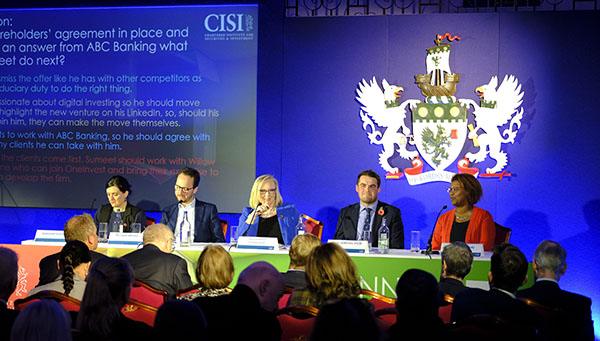An expert panel discussed a trio of thought-provoking dilemmas at our event on 1 November
by Sophie Mackenzie
View the event on CISI TV to earn 70 mins CPD
Over 160 guests joined us in person at the magnificent Plaisterers’ Hall in the City of London for our yearly event, with a further 1,047 from more than 50 countries attending virtually, from Bangladesh to the UAE and America to Australia. Some had arranged group ‘watch parties’ with colleagues.
Consistent with our aim of promoting high standards of ethics and integrity within the financial services sector, the event presents a number of ethical dilemmas, and the audience, after listening to panellists debate the options in a given scenario, vote on their preferred choice.
Opening the event, chair Tracey Davidson, deputy chief executive of Handelsbanken and chair of the CISI Ethics & Integrity Committee, emphasised the importance of integrity in troubled times, against the backdrop of war in Ukraine, increasing fiscal uncertainty and the ongoing climate crisis. Tracey introduced a new element to the format, explaining that each panellist had been asked in advance to ‘sponsor’ a dilemma, and that views expressed by them would not necessarily be their own.
The panel comprised Deborah Gilshan, founder, 100% Club; Ross Jeffries ACSI, financial planner, Panoramic Wealth Management; Richard Winder, head of sustainability, Handelsbanken; and Rosalyn Breedy, a financial services lawyer specialising in private wealth.

Social network
CISI chair Michael Cole-Fontayn MCSI read the first dilemma. It concerned a celebrity client of a financial services firm, a social media influencer named Nik, who had accrued a growing online following through his posts about overcoming financial difficulties and living frugally in difficult times. The firm’s representative discovered at a meeting with Nik that he was “not struggling financially at all,” and had net assets of around £3.5m.
Transcribing the minutes of the meeting, an assistant, Charlotte, was outraged to discover this and, as a former fan, took to her personal Twitter account to express her disillusionment, although without naming Nik or being drawn into attempts by her followers to identify him. The ethical question followed: in the absence of an official social media policy, what action, if any, should be taken against her? Should she a) be dismissed, b) asked to delete the post and given a written warning, c) formally investigated and subjected to a disciplinary hearing, or d) left to post her ethical views on her personal social media as she pleases?
Each of the panellists then advocated for one of the possible outcomes. Much of it centred around the lack of a formal social media policy creating grey areas, as well as the firm’s duty of care to its staff and clients, but perhaps the most compelling point came from Rosalyn, who said, “Fundamentally, if you’re looking at this from the perspective of integrity, Charlotte has integrity, and she’s calling out somebody who doesn’t have integrity.”
The panel then took questions from the audience and a spirited discussion ensued. The dilemma was then put to a vote, with 56% of delegates opting in favour of the second outcome – Charlotte being asked to delete her post and given a first written warning.
Test or release
The second dilemma was presented by Aisha Williams, Chartered MCSI, senior professionalism manager, LGT Wealth Management, who serves on the CISI Ethics & Integrity Committee. The dilemma may have been familiar to some of the audience already as it was published in The Review in June 2022.
It centred around Meena, head of operations at a financial services company, where she manages a team of seven. “She is good at her job, but has found the past couple of years extremely difficult due to frequent staff turnover, with Operations Team leaders not lasting longer than six months due to the workload and the organisation not looking after its staff or making them feel valued,” Aisha explained.
Her newest Operations Team Leader, Hiromi, fits in well with the team and is liked by everyone. However, he doesn’t manage his time effectively, often missing deadlines and coming up with excuses when questioned. For various reasons, Meena wonders whether there could be learning difficulties at play, but Hiromi is reluctant to engage when she tries to discuss this with him. Meena’s line manager wants her to put more pressure on Hiromi to deliver, suggesting that laziness is the problem, while an external HR adviser suggests offering him a formal assessment, which he declines. Meanwhile, Meena is on the verge of receiving a job offer from a competing firm.
Delegates were given four possible courses of action Meena might take: a) wait to see if she gets the new role and leave, b) insist that Hiromi undergo a formal assessment, c) escalate the issue to a senior stakeholder, or d) have Hiromi transferred to another department or dismissed.
The panellists were critical of the culture and lack of support within Meena’s organisation, with Ross bluntly saying that high staff turnover “in conjunction with seemingly a team of employees that can’t train anyone, is a bit of an issue”, and Richard describing it as a “lamentable regard to pastoral care”. Delegates seemingly concurred with this view, with 63% voting for Meena to escalate the issue to a senior stakeholder in the hope of receiving better guidance.

Read the dilemma in The Review
Who owns our clients?
The third dilemma was read by Simon Culhane, Chartered FCSI, senior international adviser at the CISI. It concerned friends Sumeet and Willow, who met as graduate trainees and have since set up their own firm, which has grown rapidly, employs ten staff and leverages future generation technology to reach more mid-level clients in a shorter timeframe. Sumeet has become increasingly interested in the tech side of the business, while leaving the day-to-day management to Willow.
Then Sumeet is approached by a leading FTSE 100 firm, asking if he would be interested in joining them. “This could mean the opportunity for doing more of what he really enjoys,” explains Simon. But there’s a catch: the larger firm wants to know what proportion of his clients Sumeet would be able to bring with him. If Sumeet leaves, he knows that the firm he founded with Willow will struggle.
Again, four possible courses of action were outlined: a) dismiss the offer and stay in business with Willow, b) make the move and inform his clients via his LinkedIn profile so they can choose to join him if they wish, c) make the move and agree with Willow how many clients he can take with him, or d) work with Willow to find someone to take his place and continue to develop the business with her.
Of all the dilemmas, this provoked the most interaction from the audience, suggesting it’s a position many financial services professionals have encountered in their careers. However, one delegate made the point that this doesn’t reflect well on the ethics of the larger firm, which is effectively attempting to get Sumeet’s expertise and his clients on the cheap, while another argued that clients should always be given the opportunity to act in their own best interest.
The floor was almost evenly split between the second and fourth options, suggesting that, as Tracey put it, “We as professionals … have a duty to make sure that we operate at the highest levels of integrity and remember that our clients come first in all things.”
It was on that note that the formal proceedings came to an end and delegates were able to continue the discussion over a networking lunch.